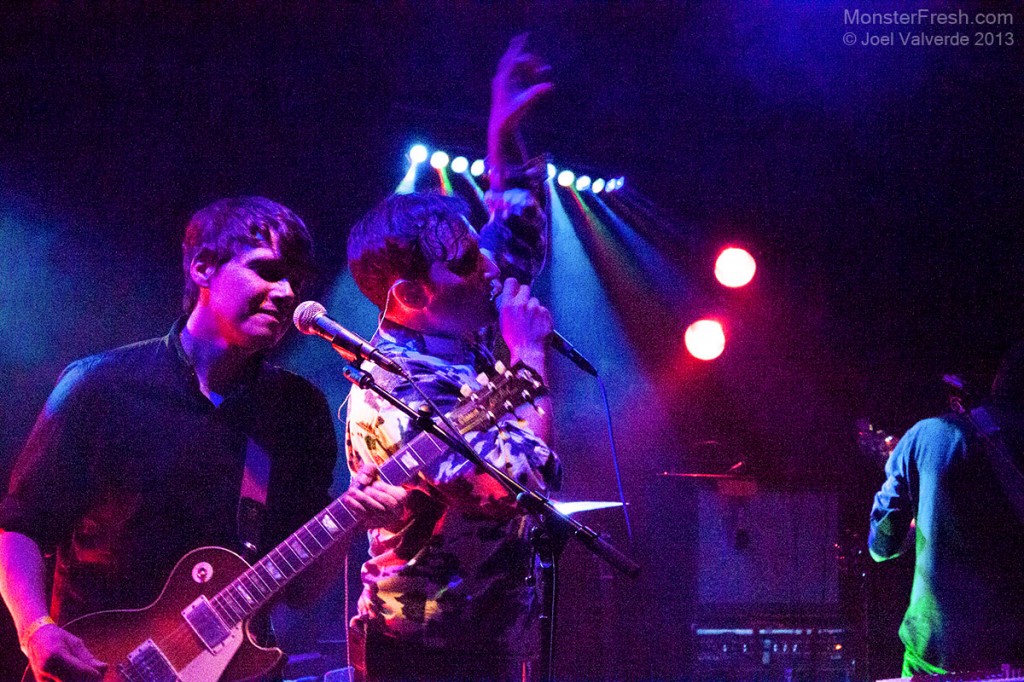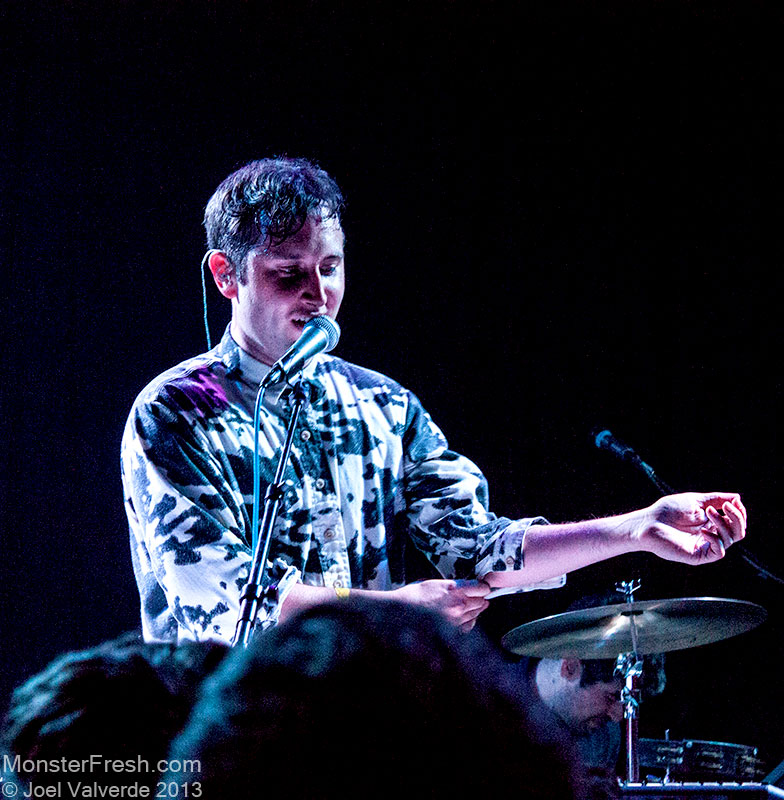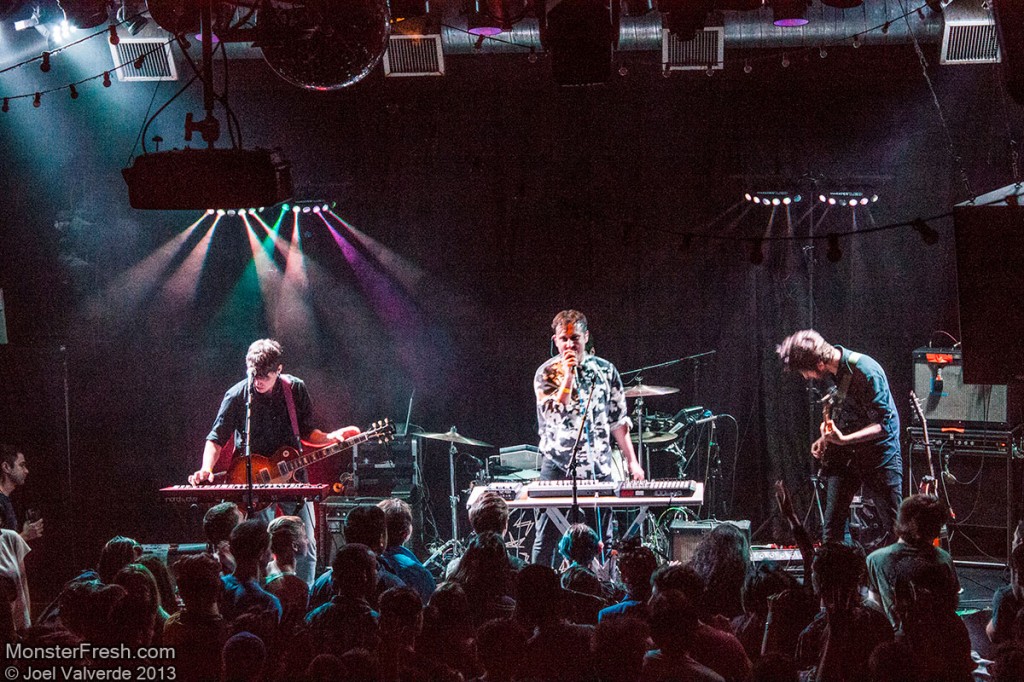Small Black Wants To Make You Dance: Small Black Live @ Rickshaw Stop [SF]
Promoting their latest release, Limits of Desire, the Brooklyn quartet attempt to prove that they are more than the chillwave label they’ve been marked with
SMALL BLACK
Rickshaw Stop
San Francisco, CA
6.11.13
In the early two-thousands, The Rapture, LCD Soundsystem, and the rest of the DFA roster reintroduced disco to the indie scene–chopped up and weirded out to fit the modern age, but tight hi-hats and locked in bass grooves all the same. A few years later, Daft Punk completed the takeover with their breakthrough leading crossover of EDM into all genres, finally giving Taylor Swift, Grizzly Bear, and Nine Inch Nails fans a common, sweat-soaked banner to crowd under at summer music festivals.
Despite the omnipresence of dance in indie rock, the audience most responsible for its re-emergence has no idea how to react to it. On their sophomore record, The Rapture summed up the issue thusly: “People don’t dance no more, they just stand there like this. They cross their arms and stare you down and drink and moan and piss.”
Granted, it’s not as dire as those NYC electro-punks made it out to be, but there remains a significant gap between performer product and recipient response. Maybe we’re all accustomed to Pavement and National shows, where the only reasonable action appears to be slack-jawed swaying or stony appreciation; the kind of intense, standoffish stare that declares, “We get it, man.” Freaking out is for kids, the ones who don’t understand the complexity, the cerebral quality of rock and roll.
Of course, that’s all, generously, a crock of contemptible shit. Music, in its basest roots, is meant to move you, to make you feel the players’ vibrations, force your body to unconsciously follow the rhythm–to quote Daft Punk, to “lose yourself to dance.” I’m discounting centuries of classical music and many significant and rewarding genres, but that’s the price you pay for rhetorical firepower.

Where am I going with this? How do my miserly rambles relate to Small Black? You came here for a show review, not a lecture, a half-assed history followed by sniping at an innocuous scene of which many would argue that I am a member. Don’t worry, we’re at the rub.
The most impressive aspect of Small Black’s performance was not their interlocking instrumentation, confident presence, or transformation of duller album tracks into certified jams; it was in the crowd response they elicited. Somehow, on a sleepy Tuesday night at the Rickshaw Stop, they created the mass motion and borderline hysteria normally reserved for festival headliners and club ready dubsteppers. Fists pumping, feet stomping, neighbor banging; the crowd was raucous, receptive, and, from the first track, vocally demanding more. In short, they moved the immovable masses.
But we’re getting ahead of ourselves. Before Small Black took hold, two allied acts loosened up our joints and moved us well past initial head nods and casual poses. First to the stage was Silver Hands, a two-piece synth pop act freshly formed in San Francisco. With only a drummer, backing tracks, and a vamping lead singer, they compensated for their lack of members with locked in enthusiasm and icy 80s grooves. Alternating between reductive and expansive takes on new wave alienation, voluptuous front woman Elizabeth Wight purred and pranced across the stage, playing the self-aware sex kitten to her drummer’s straight man foil.
Next up was Heavenly Beat, a trio of Brooklynites firmly tapped into the beach pop revival. Sailing through a series of sunshiney jangles driven by strutting bass lines, bandleader, John Pena–bassist for Beach Fossils–offers a more intimate and danceable version of his day job’s signature sound. While the tunes are more appropriate for the bedroom than the seaside, Pena’s bouncing energy and self-deprecating stage banter kept the crowd engaged. At top form–on recently written and not yet released songs–he suggested a vision of Prince fronting Real Estate, merging slinky funk and stoned suburban glaze seamlessly. The only glaring absence was a live drummer; pre-programmed orchestrations and rhythms work, but they never replace the real thing–not in rock music. To really bring tracks like this to life, you need the organic thunder that only a breathing drummer can conjure.
After a few brews with my trusty photographer, we wedged up close for the oncoming onslaught, squeezed between the wall, a few couples, and a pack of bros. From their first steps to the stage, there was a decisive difference in Small Black’s approach; their power. They are far from an established, mainstream band, but their confidence–the coolheaded assurance that they were in the right place, doing what they should be doing–granted the crowd license to react accordingly.

It took a few go rounds before we committed all the way to their act, the timidity of self-conscious audiences still too evident. Once we found the beat and lost the hangups, however; we went all in, waves of crashing, rolling people to match the enveloping sound. Despite their bare minimum of stage personality, they had the room hanging on every note. Their appeal, their presence, can be summed up in lead singer Josh Kolenick’s off-color camouflage shirt; Small Black’s songs seem to blend organically into the faded, streak-filled world surrounding, yet there’s always a catch; a sticking, gurgling rhythm that blears your vision and stands out through the fog. They are easy to vibe to, enjoy in a purely melodic sense, but there is enough askew in their work to keep even the most basic melodies fresh.
Though they started as disciples of a pan flash of a genre–Chillwave–the Brooklyn outfit have diversified their sonics to include soaring New Wave touchstones and this side of subtle disco snaps. Building on the machine blips and washed out vocals that characterized their early work, material from their latest record, Limits of Desire [Jagujaguwar], hits like John Hughes teenage anthems played through a wall of shimmering feedback. The deep synth pockets and still muddled vocals create a delirious, spinning sensation, while shooting choruses and winding guitars guide heart and head in unison. On record, some of the tracks flatten out with too clean production, but their in-person energy upsets keel into frenzy.
Sloshing around in a proper indie dance party, the likes of which are rarely seen without strong chemical enhancements, the crowd reached full-on freakout during the encore, when they brought out debut single “Despicable Dogs.” There’s plenty of strong material in their catalog, but nothing hits like that perfect mix of pulsing synths, distant words, and driving backbeat. After declaring that we were the best crowd that they’ve seen outside of New York City, Small Black left the stage and we all went home, still buzzing from the rarity of a near perfect marriage of output and response.
